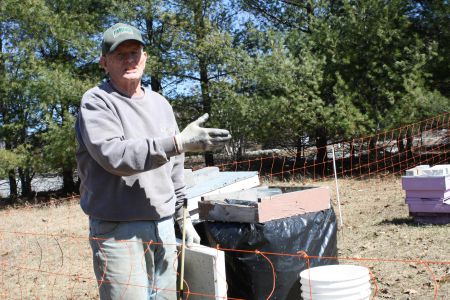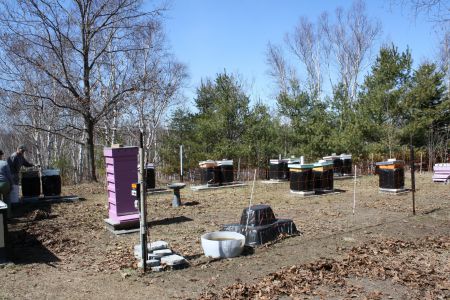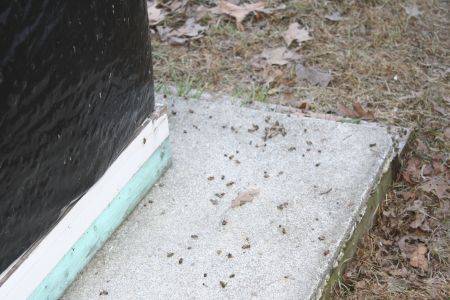The Sudbury & District Beekeepers Association (SDBA) is all about "Beekeepers Helping Beekeepers". The 100 or so members are primarily hobbyists, with only 4 having operations with more than 10 hives. Still, with a single hive housing around 60,000 bees, that's a lot of bees!
The May meeting drew about 40 beekeepers and a couple of other folks like me who snuck in just to check it out.
The first half hour was a friendly meet-and-greet: beekeepers chatting with beekeepers about all things "bee". There were discussions about the best winter wrapping for hives, ice buildup, wind-breaks, solar electric fences and fences with high pitched noises to keep out various critters; problems with mites, cats, rabbits, and of course, bears. One fellow said he had already had a visit from a hungry bear this season.
The SDBA has a fairly extensive lending library of videos and books about bees and beekeeping. Their meetings are educational and usually include a guest speaker or presentation. April's speaker was a pharmacist who talked to members about bee sting allergies and how to use an Epi Pen. Upcoming meetings will include an Agricultural Development Advisor with a presentation on business planning and an Apiary Inspector who will talk about the Beekeepers Financial Assistance Program in response to colony collapse disorder and bee losses.
"Why did my bees die?" That is the question these beekeepers have been asking themselves. "What can I do?" is the question they were asking each other. Raising bees, like any other farming activity, has always had its challenges. There are a variety of infections, viruses, fungi and parasites that can affect bee hives. Veroa mites have wreaked havoc on domestic and wild bees since their arrival in Canada in the 1990's. Electric fences are a necessity. Our long, cold winters mean hives must be wrapped and fed. Our changing climate is creating new challenges.
There was a lot of knowledge in that room, and a lot of support. It was definitely "beekeepers helping beekeepers". People talked about their setups, what they found inside their hives this spring and tried to help each other come up with better ways to support their colonies.
It's a hard time to be a beekeeper. It's a worse time to be a bee. In Northern Ontario, in fact, all over the world, bees are dying by the billions - not just domestic honey bees, all kinds of bees and all kinds of other pollinating insects too. Beekeepers are suffering unsustainable losses.
Twenty years ago, when Bob Dewar got his first hives, a 15% loss over the winter was acceptable. Bob lost 4 of his 16 hives this year; that's a quarter million bees, and he did relatively well. Locals are reporting average losses over 40% and there are some who lost everything - completely wiped out; including a fledgling beekeeper who had his hives housed in Bob's bee yard.
Neonicitinoids causing colony collapse has been the big game changer. This class of powerful systemic pesticides introduced in the last 20 years is used by farmers as seed treatments and sprays for crops and by consumers as lawn treatments. "Neonics" have now been proven deadly to bees and have been banned in the European Union. Canadian beekeepers, scientists and environmentalists have been working to make consumers and farmers aware, encourage stores to stop selling neonics and push our government to put a ban in place. A "Friends of the Earth" petition demanding a ban was passed around at the meeting.
The Ontario government is encouraging farmers, who depend on neonics to reduce crop losses, and beekeepers who are being wiped out, to work together. Tracey and Dan Seguin, the beekeepers from Lavigne who presented a beekeeping seminar in January, talked about how our relative isolation and lack of massive farming operations here in the north had been somewhat protective in slowing the effects of neonics until recently. They also talked about the good relationships many northern Ontario beekeepers already have with their farming neighbours who let them know when and where they are spraying.
A one-time "Beekeepers Financial Assistance Program" available through the Ontario Ministry of Agriculture and Food will not be of much use to local beekeepers. Most local operations are too small to qualify and the $105 compensation per hive covering only losses over the 40% mark doesn't begin to replace the lost bees or make up for the loss of honey production.
The new beekeepers I met at Bob's bee yard in April still are not set up. They can't find bees to buy. Normally local beekeepers buy bees from each other but this year because of the huge losses across the board, there are no bees available.
When I visited Bob in April, he already knew that he had lost 4 hives over the winter. Now he has realized that two more hives are without a queen. She may have died or perhaps left. Whatever the reason, there is no hive without the queen - no larvae, no new bees, no purpose for the rest of the colony, and no honey. Bob has thus far been unsuccessful in finding queens to replace the ones he lost.
The beekeepers who are losing their bees, the farmers who are dependent on the pesticides and indeed all of us, are victims of the chemicals that are now in our soil, water and in the leaves, seeds, flowers and roots of plants everywhere.
**********************
The Sudbury & District Beekeepers Association meets the third Wednesday of the month at Lo-Ellen School, 7 pm. If you decide to check it out for yourself, you will find a whole room full of people as welcoming and just as happy to talk bees as Bob Dewar. You can also check out their awesome new website at www.sudburybeekeepers.com.
The next leg in my bee adventure is a visit to the Beekeeping Course for Beginners June 14th at the home of a local beekeeper. There is still room if you care to join us. I am bringing my camera and wearing white pants (Bob said bees don't like black and I believe Bob knows what he's talking about!)


